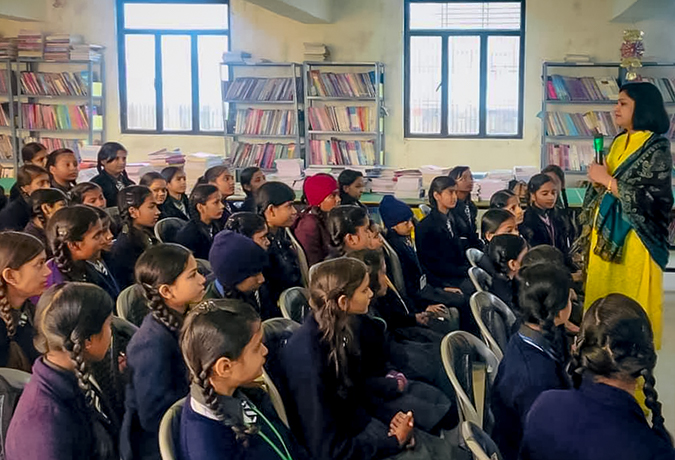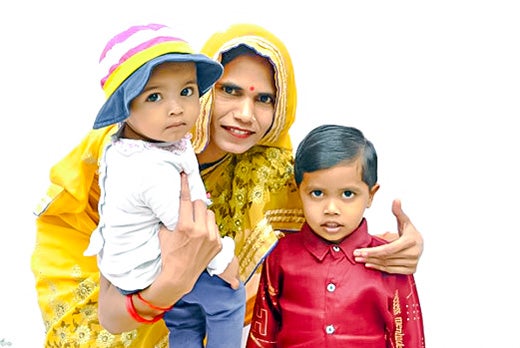Ankita’s Blog
We must help India’s rural women bring up good children with promising futures
Date: Wednesday, January 22, 2020
Author: Ankita Raj
In many places around the world, mothers who want to bring up their children in the right way have access to many resources: books, websites, social-media support groups, parenting classes, educated friends. They transform their homes into preschools and guide their children to promising futures.

It’s a totally different situation, however, for impoverished mothers in rural India who don’t have access to any of this.
Take the case of Madhu, 22, who lives in Farukhabad district of Uttar Pradesh state in northern India. She completed only primary school and is financially dependent on her husband, who works 200 miles away as a domestic helper and earns the equivalent of about USD 105 a month.
Madhu has two children, aged 11 months and four years. She mostly agrees to whatever they ask for, not knowing when and how to turn down their demands. It’s a challenge for Madhu to teach them basic etiquette —like when to say “thank you,” “sorry” and “please”— because she herself doesn’t know. What’s more, family members often have acrimonious arguments in front of the children, oblivious to the bad impact this has on them.

Here’s a typical conversation that shows Madhu’s lack of parenting skills:
Son, holding a mobile phone: “What is this?”
Madhu: “Phone. Put it back. You will break it. It’s very expensive.”
Son: “How does it work?”
Madhu: “Ask your father when he returns.”
Here Madhu lost an opportunity to teach her son. What about all the other important things a curious child will need to know? What do the traffic signs mean? What is alcohol and why do people drink it? How do you manage money? What are sanitary pads for?
Rural women like Madhu are being helped by paramedical workers from Government childcare agencies like Anganwadi (Courtyard) and Accredited Social Health Activist (ASHA). Authors of parenting books or educated mothers who read parenting books teach these workers, who then go door-to-door to teach the mothers the dos and don’ts of parenting. They cover topics including health, nutrition, contraception, and family well-being. ASHA workers helped Madhu keep a vaccination chart and get her son in school when he was three. The workers repeated their instructions to Madhu when her second child was born.
Some parents believe a child will routinely understand things by themselves as time passes. But UNICEF says a positive home environment and good parenting strategies help determine a child’s chances for survival and development. UNICEF’s Progress Report 2018 says, however; that only half of Anganwadi workers in Rajasthan and Maharashtra states know how to give preschool education to children two to six years old.
Governments must invest in educating mothers about parenting if they are to keep their promises to the Beijing Declaration and Platform for Action and help ensure a future of self-confident, productive and socially aware adults.
Paramedical workers in the rural areas can show mothers how to teach their children things like good manners; reading, singing and dancing; caring for animals; staying safe; and what to do if someone abuses their private parts. A boy who is told to let a girl in the queue fill her water bottle first will learn to respect women in adulthood. The mothers can be taught how to make schedules, be patient, share inspiring stories with their children, and give them practical explanations.
In my survey of 1,000 poor women in Kaushambi district of Uttar Pradesh last year, about 12 per cent of the women had no basic education and only 44 per cent had a primary education. About 65 per cent had never held real discussions with their children. The men, who are the providers in 88 per cent of the homes, had alcohol problems and were angry about their low social status and lack of work. Ninety-three per cent of the women said their children were victims to this behaviour.
I have been teaching poor mothers in my neighbourhood about parenting. You need to provide good food and medical support so the child will be healthy. But you also need to build the child’s character, so they won’t become criminals and so the parents won’t have troubles in their old age. You have to encourage the child to listen and to respond appropriately. Instead of ordering the child to go and study, I tell the women to say, “Get your book and teach me.”

Ankita Raj is the founder of Greenhath Products and a founding member of Heisenberg International School, Jaunpur (India). She has two toddler daughters. Her research interests are entrepreneurship, quality education and women in public policy. She previously worked for Redington India Ltd. She is an Engineering and MBA alumnus of Jaypee Institute of Information Technology and is doing a PhD in rural women’s empowerment through employment, from GLA University (Mathura) India. Ankita speaks at public events and on TV shows. You can listen to her tips on parenting here.
Ankita’s social media accounts:
Facebook: https://www.facebook.com/ankita.raj
ORCID: https://orcid.org/0000-0001-7135-0778
Facebook (Greenhath): https://www.facebook.com/Greenhath-1310320755739142